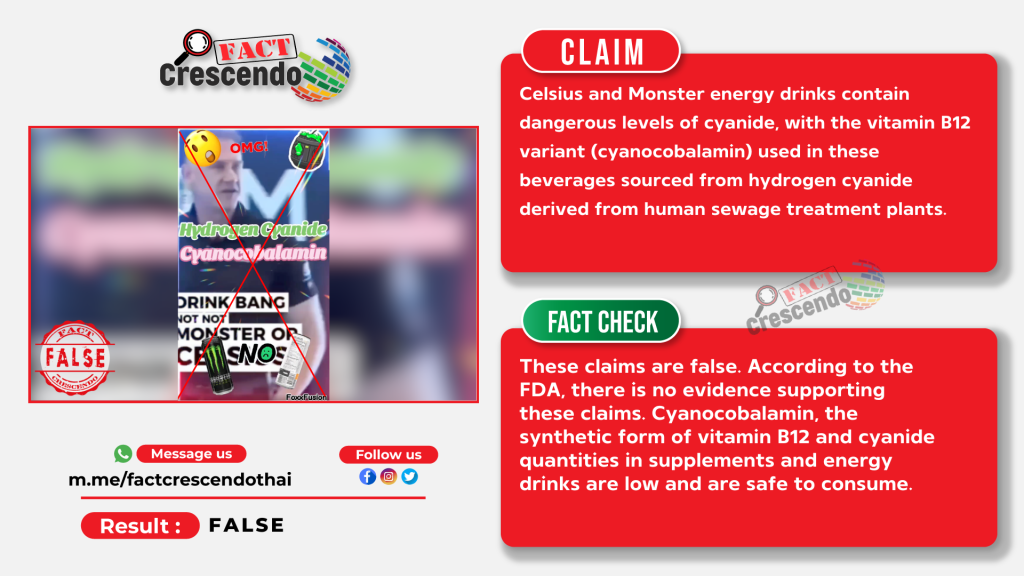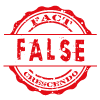
Recently, a video is circulating on social media with a claim suggesting that Celsius and Monster energy drinks contain harmful levels of cyanide and that the vitamin B12 variant (cyanocobalamin) used in these drinks is derived from hydrogen cyanide sourced from human sewage treatment plants.
Social Media Claims
The video circulating on Facebook and other online platforms claiming that Celsius and Monster energy drinks contain four times the daily cyanide limit for humans. It further says, cyanocobalamin used in these products is synthesized from hydrogen cyanide sourced from human sewage treatment plant waste, turned into a powder, mixed with a metal, and put into our vitamins. When you return home, check your supplements and protein powders for cyanocobalamin.
Fact-Check
Cyanide Levels in Energy Drinks: No supporting evidence exists that proves energy drinks like Celsius have detrimental amounts of cyanide. The U.S. Food and Drug Administration (FDA) has found no data to suggest the presence of hydrogen cyanide in energy drinks. It has also approved cyanocobalamin for use in fortified foods and dietary supplements because of its stability and ability to prevent cyanocobalamin (B12) deficiency.
Cyanocobalamin vs. Methylcobalamin:
- Cyanocobalamin is a synthetic version of vitamin B12 often found in supplements and energy drinks. It does have a cyanide molecule, but the quantity is so small that it’s not harmful to humans. After being consumed, the body transforms cyanocobalamin into active forms of vitamin B12 and a small amount of cyanide is released. This cyanide is quickly neutralized and eliminated by the body (Source).
- Methylcobalamin is a variant of Vitamin B12 that doesn’t contain cyanide. Both Methylcobalamin and Cyanocobalamin are useful in addressing Vitamin B12 deficiencies. However, there isn’t enough evidence to suggest that one form is significantly safer or more potent than the other for the majority of individuals.
It’s crucial to understand that cyanide, in small amounts, is not harmful to humans. Dr. Walter Willett, a Professor of Epidemiology and Nutrition at Harvard’s School of Public Health, confirmed this in an email to USA TODAY. He mentioned that while most B12 supplements indeed contain cyanide, the amount is exceedingly low and poses no toxicity to humans. Willett pointed out that “many healthy foods, like spinach and almonds, naturally contain small amounts of cyanide. Although cyanide is harmful in large quantities, the levels used in vitamin supplements are not dangerous.”
Hydrogen Cyanide is NOT equal Cyanide or Cyanocobalamin
Hydrogen cyanide is a highly toxic chemical compound and is not found in energy drinks like Monster or Celsius. In contrast, these drinks often contain cyanocobalamin, a form of vitamin B12. Although cyanocobalamin contains a cyanide molecule, it is safe to consume because the cyanide is bound in a way that neutralizes its toxicity. When ingested, cyanocobalamin is converted into active vitamin B12 in the body, releasing such small amounts of cyanide that it doesn’t pose a health risk. The text emphasizes that the term “cyanide” in cyanocobalamin often causes confusion, but the compound is harmless and beneficial as a vitamin supplement.
Source of Cyanocobalamin: Although a historical patent from 1953 exists for producing B12 from sewage sludge, this method is applied to animal feed production, not for creating human supplements. According to Celsius, cyanocobalamin is not produced from hydrogen cyanide or any other undesirable substances. Instead, it is manufactured with the same bacteria that produce vitamin B12 in animals.
Previously, Fact Crescendo had debunked a similar claim which mentioned that cyanocobalamin present in the energy drinks like Monster is manufactured from sewage sludge. But this is a misleading claim. Cyanocobalamin is a widely used, stable and effective form of Vitamin B12, produced through safe and regulated methods.
What Amount of Cyanide is Considered Safe?: According to CDC, EPA (Environmental Protection Agency) limits cyanide in drinking water to 200 micrograms per liter and in stored food treated with cyanide to control pests, the maximum allowed is 50 ppm for citrus fruits. Industries must also report spills of certain cyanide compounds if they exceed specific weights.
Again, it’s important to clarify that both energy drinks, Monster and Celsius, do not contain harmful cyanide. Instead, they include a form of B12 known as “cyanocobalamin”. Monster contains approximately 5.14 micrograms of B12, while Celsius contains 6 micrograms of B12. Both are certified safe for consumption.
Monsters and other drinks have a few more ingredients like Taurine, Panax Ginseng, Guarana, Inositol etc. Details about these can be read here.
Conclusion:
The allegations that Celsius and Monster energy drinks contain dangerous levels of cyanide and the vitamin B12 variant (cyanocobalamin) used in these beverages is produced from hydrogen cyanide derived from human sewage treatment plants are unfounded. According to the FDA, there is no evidence indicating the presence of hydrogen cyanide in energy drinks. Cyanocobalamin, a synthetic form of vitamin B12 commonly found in supplements and energy drinks, is considered safe. The cyanide molecule in cyanocobalamin is present in such small amounts that it does not pose a risk to human health. Additionally, the production of cyanocobalamin does not involve hydrogen cyanide or any other undesirable substances.

Title:Fact-Check: Are Celsius and Monster Energy Drink Harmful?
Fact Check By: Cielito WangResult: False




